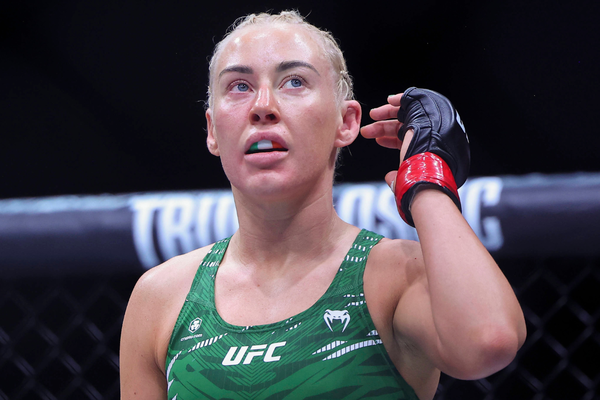
via Imago
Credits – Imago

via Imago
Credits – Imago
Fighter pay has long been a divisive issue in MMA, with many athletes struggling to make ends meet despite competing at the highest level. But at UFC London, Shauna Bannon not only secured her first UFC win but also received a life-changing $50,000 bonus from Dana White. As a single mother balancing the demands of professional fighting with raising a child, this financial boost meant more than just a paycheck.
Bannon expressed her gratitude on social media, responding to the news with overwhelming appreciation. She took to X and replied to a post about her bonus-winning performance. The caption to the post read, “50k for Shauna Bannon… A single mother who’s dedicating her life to MMA in pursuit of providing for her young son, Jayce… No better place for that money to go to… “Mama B” earned that one! 💰🥋”
However, her story also highlights a recurring issue in the UFC—fighter compensation. The debate reignited recently when Jared Cannonier revealed he was nearly broke before a similar bonus saved his career, raising questions about whether fighters should have to rely on these unpredictable payouts to stay financially secure.
ADVERTISEMENT
Article continues below this ad
For years, UFC fighters have voiced concerns about the financial strain of competing in the promotion. Francis Ngannou’s highly publicized departure was fueled by pay disputes, and Sean O’Malley has repeatedly criticized the system, pointing out that many fighters barely break even after covering training expenses.
— Shauna Bannon (@ShaunaBannon5) March 23, 2025
The conversation around fighter pay became even more intense after UFC 300, where several fighters claimed they still depend on performance bonuses to make a living. While White argues that fighters have multiple opportunities to increase their earnings, the reliance on these bonuses as a financial lifeline has sparked ongoing criticism.
Bannon’s situation echoes the experiences of fighters like Kevin Holland, who has admitted that early in his career, bonus money was crucial in helping him invest in his future. The question remains however, whether UFC fighters have to rely on these one-time payouts to stay afloat, or if the system itself requires fundamental change?
What’s next for Bannon? Can she capitalize on her momentum?
Beyond the financial aspect, Bannon’s win at UFC London proved she has the potential to be a serious contender in the strawweight division. However, the path ahead won’t be easy. A similar situation unfolded with Paddy Pimblett, whose early UFC success generated massive hype but also brought scrutiny over his level of competition. Questions about his ability to compete against ranked opponents have persisted, making his trajectory uncertain.
ADVERTISEMENT
Article continues below this ad
Bannon could face a similar challenge as she attempts to break into the top tier of the division. The UFC may choose to build her up gradually with winnable fights, or she could be thrown into deeper waters against established veterans. A matchup against someone like Angela Hill would test her striking, while a fight against Tabatha Ricci could challenge her ground game.
With the UFC always looking for fresh stars, Bannon’s performance has set the stage for a critical next step in her career. But will she continue to rise through the ranks, or will the challenges of elite competition slow her momentum?
ADVERTISEMENT
Article continues below this ad
Shauna Bannon’s victory at UFC London is a career-defining moment, but it also sheds light on the broader conversation surrounding fighter pay. While the $50,000 bonus changed her life, it raises the question—why are so many fighters still financially dependent on performance bonuses to survive in the world’s premier MMA organization?
As the debate over UFC fighter compensation continues, Bannon’s story serves as both an inspiration and a stark reminder of the financial hurdles many athletes face. Will the UFC address these concerns, or will fighters like Bannon continue to rely on unpredictable paydays to sustain their careers?
Have something to say?
Let the world know your perspective.
ADVERTISEMENT
ADVERTISEMENT
ADVERTISEMENT
ADVERTISEMENT



What’s your perspective on:
Is relying on bonuses sustainable for UFC fighters, or does the system need a complete overhaul?
Have an interesting take?